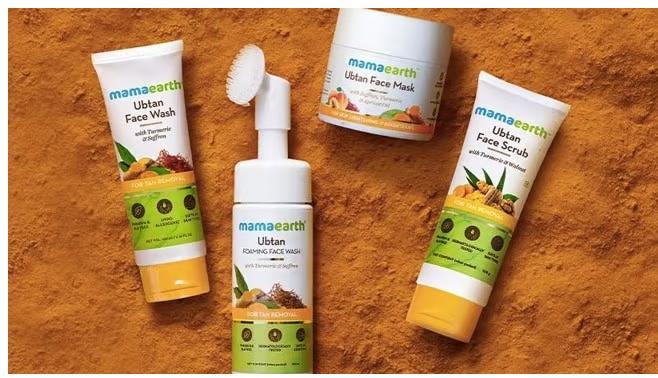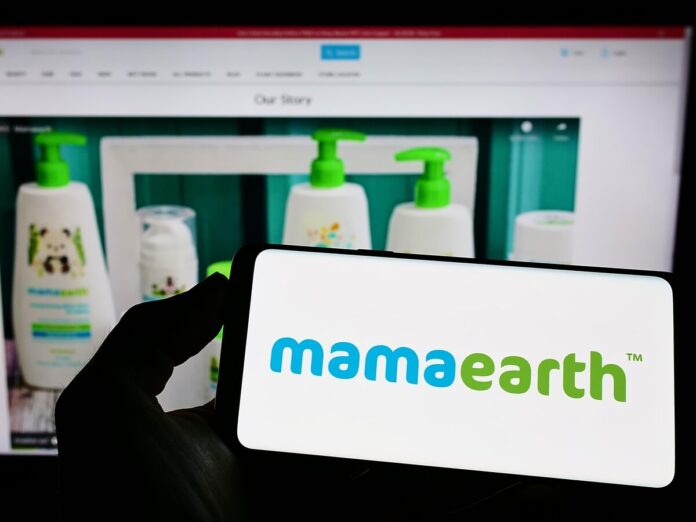Mamaearth Suffers Severe Market Shock As Investors React To Losses
The market has turned ruthless for Mamaearth-parent Honasa Consumer as the personal care giant faces a dramatic ₹3,500 crore erosion in its market capitalization. Within just two days of trading, the company’s shares plummeted by a staggering 30%, leaving investors in dismay and shaking confidence in what was once considered one of the brightest stars in India’s D2C (Direct-to-Consumer) space.

₹8,567 Crore Valuation After The Fall Raises Eyebrows Among Analysts
Once the darling of the stock market with its eco-conscious branding and loyal consumer base, Mamaearth now finds itself valued at ₹8,567 crore following the share price plunge. The sell-off came after the company revealed its first quarterly loss since its much-hyped IPO in November last year. This steep decline has sparked debates among market analysts about whether the brand’s sky-high valuation was overestimated right from the start.
A Loss Of ₹19 Crore Puts Mamaearth In The Spotlight For The Wrong Reasons
The company reported a net loss of ₹19 crore for the September quarter alongside a 7% decline in revenue. For a brand that built its reputation as a sustainable and profitable entity, these numbers came as a jarring wake-up call. Investors who had been betting big on the company’s success were left disappointed, triggering a rapid sell-off. The numbers suggest that Mamaearth is now facing a harsh reality of tightening margins and increasing competition in the crowded personal care segment.

Investor Sentiment Crumbles Amid Doubts Over Growth Trajectory
The sharp dip in shares reflects the growing unease among investors over Mamaearth’s ability to sustain its high valuation. With newer entrants in the personal care space eating into its market share, the brand appears to be losing its edge. “The hype around D2C brands was immense, but now we’re seeing the cracks in the foundation,” said a stock market analyst. “Mamaearth is a cautionary tale for other brands looking to ride the IPO wave without proving their profitability.”
Premium Valuation No Longer Justifiable, Say Experts
Mamaearth’s IPO was lauded for setting a benchmark in the D2C space, but critics now argue that the company’s valuation was inflated. While the brand’s eco-conscious image and rapid growth initially attracted investors, sustaining the momentum has proven to be a challenge. With profitability now in question, the premium valuation is no longer seen as justifiable.
Rising Costs And Competitive Pressures Take A Toll On Margins
The company is reportedly grappling with rising operational costs, which have eaten into its margins. At the same time, increased competition from domestic and international players has intensified the fight for consumer attention. While Mamaearth initially gained traction for its toxin-free, natural products, similar offerings from competitors have diluted its unique selling proposition.
Post-Pandemic Spending Shifts Hit Discretionary Categories
Experts also point out that a shift in consumer spending patterns post-pandemic has impacted categories like premium personal care. With consumers tightening their wallets, discretionary spending has taken a hit, affecting brands like Mamaearth that rely on premium pricing. “The pandemic has fundamentally changed how consumers prioritize their spending,” said a market expert. “Mamaearth needs to adapt to these changing dynamics if it wants to stay relevant.”

D2C Brands Under Scrutiny After Mamaearth’s Market Debacle
The dramatic fall in Mamaearth’s shares has sent shockwaves through the broader D2C ecosystem in India. Investors are now likely to approach other D2C brands with caution, scrutinizing their growth metrics and profitability before committing funds. Startups in this space will need to demonstrate a clear path to sustainable growth if they hope to win investor confidence.
Honasa Consumer Plans To Reassure Stakeholders Amid Chaos
Despite the market turmoil, Honasa Consumer has remained optimistic about its future. The company issued a statement reassuring stakeholders of its commitment to long-term growth. “We are navigating a challenging period, but we are confident in our strategy and ability to deliver value,” a spokesperson said. The company plans to focus on expanding its distribution network, launching innovative products, and reducing operational inefficiencies to regain investor trust.

Recovery Strategy Could Include Tier 2 And Tier 3 Expansion
As part of its recovery plan, Mamaearth is expected to deepen its penetration in Tier 2 and Tier 3 cities, where demand for affordable, quality personal care products is growing. By tapping into these markets, the brand hopes to offset the slowdown in urban areas and drive revenue growth. Additionally, the company is exploring ways to streamline its operations to improve profitability.
What Lies Ahead For Mamaearth And The Industry?
The challenges facing Mamaearth are indicative of broader issues in the D2C space. While high valuations and rapid growth make for great headlines, they often mask underlying vulnerabilities. For Mamaearth, the road ahead will require balancing growth ambitions with a focus on profitability. The brand’s ability to innovate and adapt will determine whether it can bounce back from this setback or become another cautionary tale in the startup ecosystem.
Investors and market observers will be closely watching Mamaearth’s next moves as it works to stabilize its stock price and rebuild confidence. For now, the sharp dip serves as a reminder that even the most celebrated brands are not immune to market realities.

